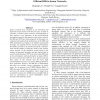1196 search results - page 7 / 240 » Leakage-aware energy synchronization for wireless sensor net... |
104
click to vote
INFOCOM
2009
IEEE
15 years 6 months ago
2009
IEEE
Abstract—In wireless sensor networks, asynchronous sleepwake scheduling protocols can significantly reduce energy consumption without incurring the communication overhead for cl...
113
click to vote
JIPS
2010
14 years 6 months ago
2010
Wireless sensor networks consist of sensor nodes which are expected to be battery-powered and are hard to replace or recharge. Thus, reducing the energy consumption of sensor nodes...
126
click to vote
TWC
2008
14 years 11 months ago
2008
Abstract--This letter proposes an energy-efficient clock synchronization scheme for Wireless Sensor Networks (WSNs) based on a novel time synchronization approach. Within the propo...
101
click to vote
TELSYS
2010
14 years 6 months ago
2010
Abstract Several applications have been proposed for Wireless sensor networks, including habitat monitoring, structural health monitoring, pipeline monitoring, precision agricultur...
ITNG
2006
IEEE
15 years 5 months ago
2006
IEEE
Sensor networks have emerged as an interesting and important research area in the last few years. In order to construct a wireless sensor network, synchronization of base stations...


